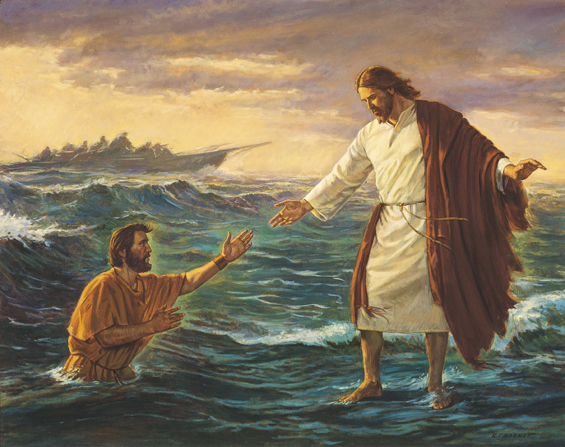Directions: Study the following parables and accounts along
with the accompanying commentary from the institute student manual. Describe in
writing what you feel is the major principle the Lord wants us to understand
from each of the parables:
Luke 16:1-12, the
parable of the unjust steward. “The Children of This World Are in Their
Generation Wiser Than the Children of Light” (p. 124)
o
Elder Talmadge explains that this parable means,
“Be diligent; for the day in which you can use your earthly riches will soon
pass. Take a lesson from even the dishonest and the evil; if they are so
prudent as to provide for the only future they think of, how much more should
you, who believe in an eternal future, provide therefor! If you have not
learned wisdom and prudence in the use of ‘unrighteous mammon,’ how can you be
trusted with the more enduring riches?” (Jesus the Christ, 464).
o
Mormon 9:28 says, “Be wise in the days of your probation;
strip yourselves of all uncleanliness; ask not, that ye may consume it on your
lusts, but ask with a firmness unshaken, that ye will yield to no temptation,
but that ye will serve the true and living God.”
Luke 16: 19-31, the
parable of the rich man and Lazarus. “What Do We Learn About the Spirit World
from the Parable of the Rich Man and Lazarus?” (P. 124-125)
o
“The Joseph Smith Translation expands upon Luke
16:16–18, making clear that in the parable Jesus taught to the Pharisees, he
was comparing the rich man to them and teaching them what lay in their future
if they continued to pervert the right way” (New Testament institute student
manual).
o
“In the parable, the Savior did not say that the
rich man was an evil man—only that with all the blessings he had been given, he
did not give from his great wealth to someone in need” (New Testament institute
student manual).
o
“In this parable, the Savior taught all of us to
be wise in how we use the temporal and spiritual blessings given to us” (New
Testament institute student manual).
o
“Abraham’s bosom” refers to paradise, and “hell”
refers to the spirit prison. The division between these two places existed
before Jesus Christ visited the spirit world between the time of His death and
His Resurrection. Before Christ’s death, spirits from paradise could not visit
those who were in spirit prison. His ministry in the spirit world bridged the
gulf between paradise and the spirit prison, making it possible for the spirits
in prison to receive the message of the gospel from authorized ministers sent
from paradise” (New Testament institute student manual).

o
“In the
parable, a rich man who had gone to hell pleaded with Abraham to send Lazarus
to his five brothers to convince them that they should repent. Abraham replied
that if they would not hear the words of the prophets, “neither will they be
persuaded, though one rose from the dead” (Luke 16:31). Such persuasion
requires a changed heart—not changed messengers. Failing to hear the prophets
is the same thing as failing to hear the Savior—the One who did rise from the
dead. “He that receiveth my servants receiveth me” (D&C 84:36), the Lord
declared. “Whether by mine own voice or by the voice of my servants, it is the
same” (D&C 1:38)” (New Testament institute student manual).
§
With
General Conference coming up on April 4-5, 2015 I would challenge everyone to
watch all sessions of General Conference and use the BYU-Idaho Learning Model
to gain more out of it.
·
Prepare-
pray specifically about something, take notes if that helps you learn, get
chores done before conference starts
·
Teach One
Another- write down names of people that you know that need to hear that
conference talk and then email it to them, use the conference talks as FHE
lessons so you can teach one another
·
Ponder/Apply-
decide one thing you can do better at to become more like the Savior and then
plan out your action steps to do that, ask your family/friends what they
learned and how they are going to apply that to their lives
Luke 17:11-19, the ten
lepers. “Why Were the Ten Lepers to Show Themselves to the Priests?” and “Were
There Not Ten Cleansed?” (P. 130) See also Bible Dictionary, “Leprosy” (p.
724).
o
Why did Jesus tell the ten lepers to “Go shew
yourselves unto the priests” (Luke 17:14)?
§
According to the New Testament institute manual “for
a leper the prescribed means of obtaining permission to reenter society
required him to show himself to the priests of the people.”
§
Also I feel like the Savior was testing their
faith. Would they believe that they would be cleansed and start going to the
show themselves to the priests. As we find out in vs. 14 this is exactly what
happened.
o
Bishop Merrill J. Bateman said, “In becoming a
whole person, the grateful leper was healed inside as well as on the outside.
That day nine lepers were healed skin deep, but only one had the faith to be
made whole” (“The Power to Heal from Within,” Ensign, May 1995, 14).

Luke 18:1-8, the parable
of the unjust judge. “Why Did the Lord Give the Parable of the Unjust Judge?”
(p. 131).
o
In vs. 1 it says, “men ought always to pray, and
not to faint”.
o
Elder Jeffrey R. Holland of the Quorum of the
Twelve Apostles taught: “When lonely, cold, hard times come, we have to endure,
we have to continue, we have to persist. That was the Savior’s message in the
parable of the importuning widow. … Keep knocking on that door. Keep pleading.
In the meantime, know that God hears your cries and knows your distress. He is
your Father, and you are His child” (“Lessons from Liberty Jail,” Ensign, Sept.
2009, 30).

Luke 18:9-14, the
parable of the Pharisee and the publican. “Why Did the Lord Give the Parable of
the Pharisee and Publican?” (p. 131).
o
Jesus uses this parable to address those “which
trusted in themselves that they were righteous, and despised others” (Luke
18:9). I feel that Jesus is warning those that are self-righteous and hypocritical.
In fact in vs. 14 Jesus says, “for every one that exalted himself shall be
abased; and he that humbleth himself shall be exalted.”
o
“The parable probably surprised those who heard
it, for Pharisees were generally admired and regarded as very obedient to the
law, though Jesus had rebuked them for hypocrisy. Publicans, however, were tax
collectors and were hated, shunned, and seen as corrupt. Though they were often
grouped with harlots and sinners, many were receptive to Jesus’s teaching” (New
Testament Institute Student Manual).



